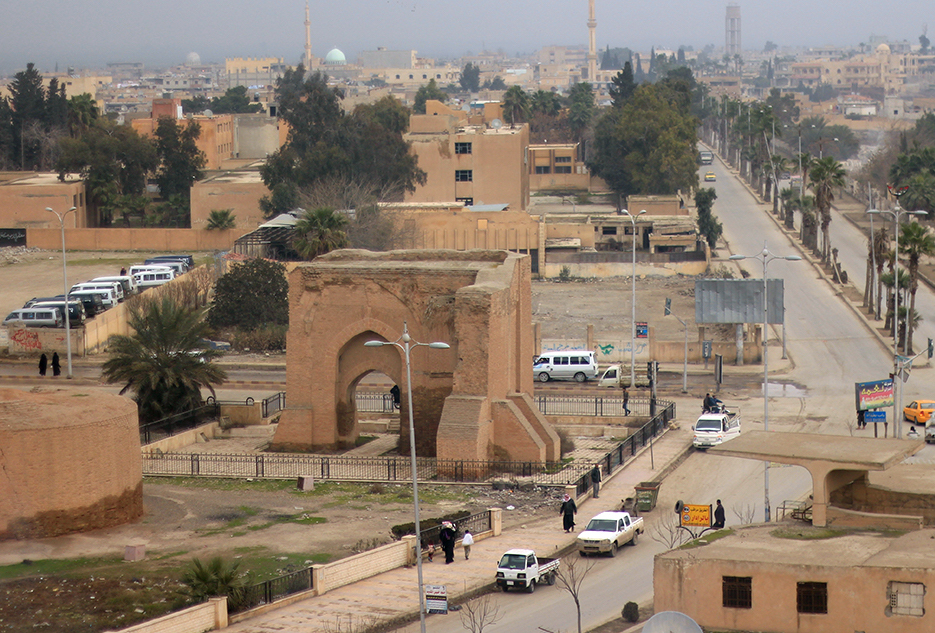Now that the Islamic State/Daesh has taken credit for three major attacks — the downing of a Russian flight over the Sinai peninsula, a double suicide bombing in southern Beirut and the concerted Friday night onslaught in Paris — there’s a growing consensus that the international community is doubling down on concerted efforts to confront the radical Sunni jihadists at their core in Syria.![]()
That began on Sunday afternoon, when French forces hit Raqqa, a city in northeastern Syria that IS/Daesh has claimed as its de facto capital, with more than 20 airstrikes. In the aftermath of Friday night’s coordinated terrorist attacks in Paris, French president François Hollande declared that the attacks amounted to an ‘act of war,’ pledging to lead a response that ‘will be pitiless,’ and the French military reaction came even while police still search for one of the alleged perpetrators of Friday’s attacks.
Well before Paris, US officials have been increasingly focused on Raqqa
As the world’s attention now turns from Paris and Beirut to Raqqa, those terrorist attacks seem likely to accelerate what’s been a gradual effort to place pressure on ISIS in Raqqa. US airstrikes last Thursday killed militant Mohammed Emwazi, popularly known as ‘Jihadi John’ in the US media. A Kuwait native who grew up in London before traveling to Syria to fight for IS/Daesh, he appeared in several videotaped beheadings of westerners, proclaiming jihadist slogans in perfect English as he and his allies murdered their victims.
In early July, a series of 16 US airstrikes also targeted Raqqa, with the goal of destroying ISIS strongholds and disrupting transit routes — an attack that killed at least six civilians. News reports suggest that the United States and its allies are gradually preparing a campaign to liberate Raqqa in tandem with the Syrian Democratic Forces, a new coalition of Kurdish, Arab and other Syrian minorities in the country’s northeast, though its strength may be more aspirational than anything else.Formed just last month, it Forces are still a somewhat nebulous group, anchored by the YPG (the Kurdish acronym for the People’s Protection Units, the Kurdish armed peshmerga fighting IS/Daesh), but which also includes Sunni Arabs and, most incredulously, some longtime pro-Assad forces.
US special forces that entered Syria in the last month, in particular, are thought to be spearheading the Raqqa effort. As Vox‘s Zach Beauchamp wrote earlier in October, a successful US-led siege on Raqqa would be difficult but would also call into doubt the Islamic State’s ability to hold, control and govern territory in Syria (or Iraq, for that matter).

In the immediate aftermath of the Paris attacks, there have already been calls in the US media to ‘erase’ Raqqa:
Alain Bauer, a leading French criminologist and adviser to officials in Paris, New York, and elsewhere about counter-terror strategies, is among those who believes that ISIS is lashing out precisely because it is under pressure on the ground….
“If we really want to do something, we need to erase Raqqa,” [criminologist Alain] Bauer told The Daily Beast. What keeps this from happening? In Bauer’s opinion, the United States. “Every bombing is a nightmare to negotiate,” he said. “Here’s a target. ‘Oops, there’s a garden there. Oops, there’s a family there. Oops, you cannot destroy this, you cannot destroy that.’”
But ISIS is embedded among the civilian population. Bauer thinks there’s an important distinction. “They are representing the civilian population,” he says, at least those who have remained and sometimes profited from the group’s presence. “They are not enslaving them. And a war is a war.”
But the facts suggest otherwise, and the limited reporting from Raqqa over the past year indicates an urban population terrorized by the Islamic State’s fundamentalist grip. Gruesome public executions are now a routine occurrence, foreign-born militants from Africa and Europe alike (often unable to speak Arabic) mix awkwardly with the local population and jihadists routinely police their moral vision, for example, forcing women to wear niqabs. Though Islamic State certainly has its supporters among the Sunni population, many of Raqqa’s civilians are, like the victims of the Beirut and Paris bombings, victims of Daesh-led terrorism.
How once-secure Raqqa became so notorious
A Vanity Fair report from last October describes a shellshocked city where bakeries no longer produce enough bread, religious police forbid smoking tobacco,photos of models and even swearing, while young children are forced to trawl through garbage in search of valuables that they can sell for money. Continue reading A primer on Raqqa, Islamic State’s so-called ‘capital’
